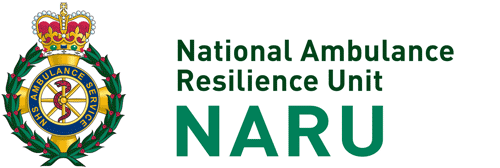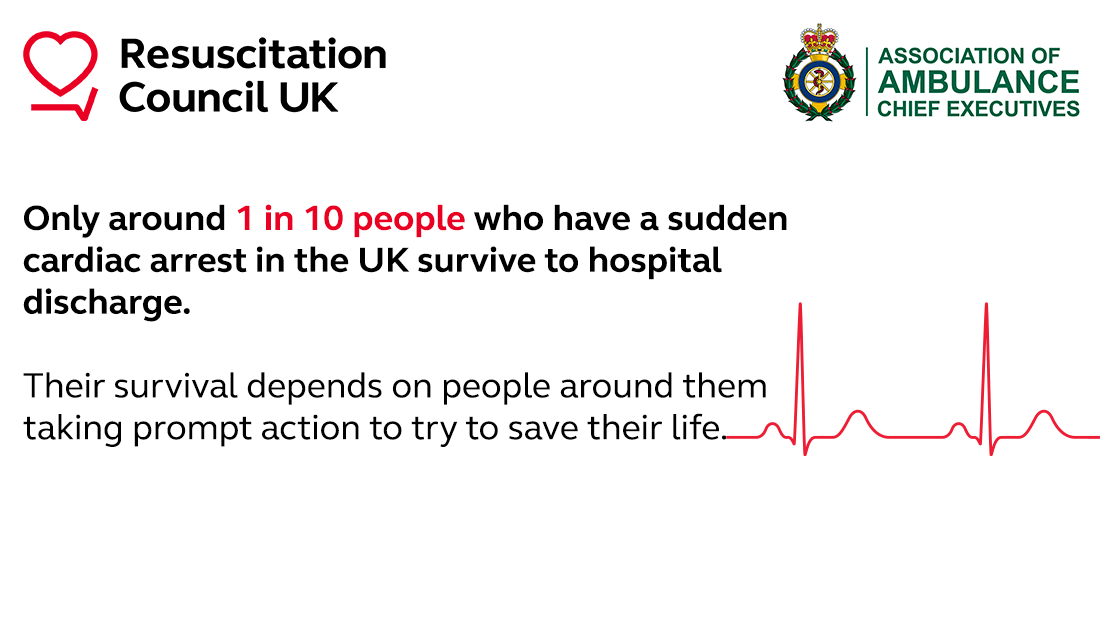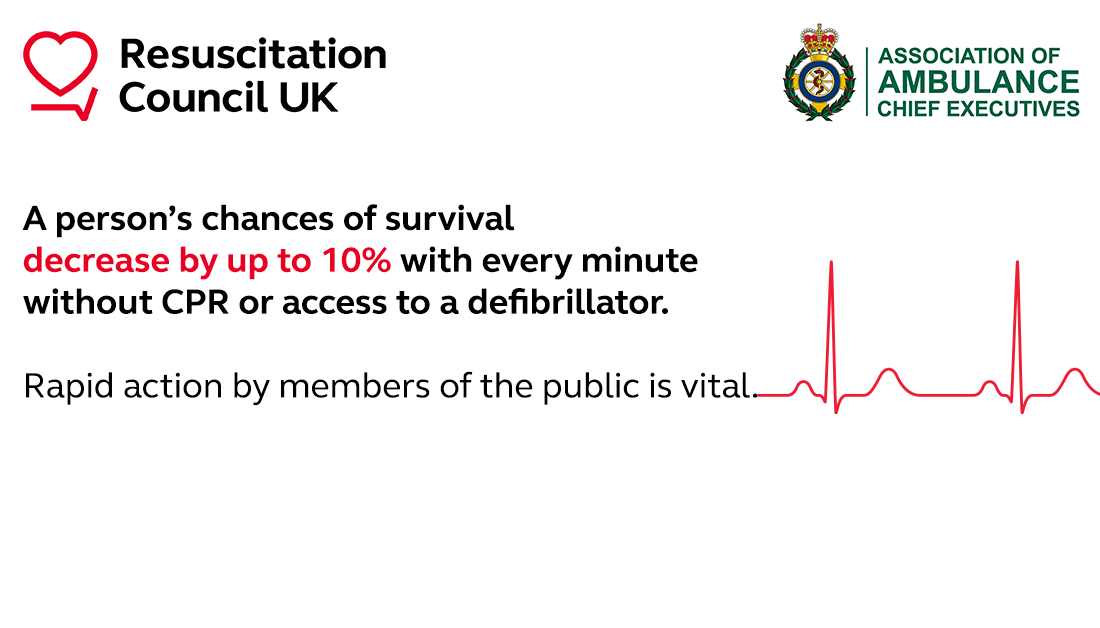Everybody across society can help save lives
Resuscitation Council UK has joined forces with the UK’s ambulance services to encourage everybody to learn, or refresh, their CPR skills, so they know what to do if someone collapses and stops breathing normally.
Only around 1 in 10 people who have a sudden cardiac arrest in the UK survive to hospital discharge, and their survival depends on people around them taking prompt action to try to save their life.
With people now getting into closer proximity to family, friends, colleagues, and strangers due to the easing of lockdown restrictions, it is increasingly important everyone has the skills to save a life and knows how to keep themselves safe.
Studies published by the London Ambulance Service and the North East Ambulance Service, based on their ambulance service data from the first wave of the pandemic, revealed that there was an increase in cardiac arrests at home and a decrease in survival.
Resuscitation Council UK and the ambulance services want to reassure people that they should be confident to act quickly and perform compression-only CPR as their actions could save a life.
The importance of community and school-based training and the need for everybody to learn the basic skills to save a life are emphasised in the latest Resuscitation Council UK Guidelines. Published last week, the RCUK Guidelines 2021 state that “every person should learn to provide the basic skills to save a life.”
However, a UK-wide survey carried out on behalf of Resuscitation Council UK in September 2020 revealed that over a third of UK adults (36%) have not received any type of training on how to help someone experiencing a cardiac arrest.
As face-to-face training is still returning to normal, the ambulance services and Resuscitation Council UK want people to make use now of the many digital teaching resources available.
This includes RCUK’s animation, which shows the steps to take to keep yourself as safe as possible when doing CPR during the pandemic and their Lifesaver game.
Every year across the UK there are around 60,000 cardiac arrests outside of a hospital setting and ambulance crews start, or continue, resuscitation in approximately 30,000 of those. As a person’s chances of survival decrease by up to 10% with every minute without CPR or access to a defibrillator, rapid action by members of the public is vital.
RCUK Guidelines 2021 highlight that:
- Recognising a cardiac arrest remains a key priority as it is the first step in triggering the emergency response to cardiac arrest.
- Witnesses need to recognise a cardiac arrest has occurred in any unresponsive person with absent or abnormal breathing.
- Call 999. The ambulance call handler will assist you with instructions for confirming cardiac arrest, starting compression-only CPR, and locating, retrieving, and using an Automated External Defibrillator.
- Start chest compressions as soon as possible and continue without stopping or leaving the person.
- Send someone to fetch an Automated External Defibrillator and bring it to the scene of the cardiac arrest.
Sue Hampshire, Director of Clinical and Service Development at Resuscitation Council UK, said:
There has been very little public attention on the importance of recognising a sudden cardiac arrest and learning CPR during the pandemic, and we want to change this.
We want everybody to feel able to do something, to act quickly and not to hesitate or worry about causing harm to the person they are trying to help. No greater harm can occur than failing to act when someone requires CPR and defibrillation.
As cardiac arrests have increased during the pandemic and as most cardiac arrests happen in the home, we want everybody to know what to do. Someone you care about may need you to act immediately to help save their life. Also, now restrictions are starting to ease, you may be more likely to witness someone collapse and stop breathing normally while you’re out shopping, at work, or elsewhere, that needs your help too.
We understand people may feel nervous about doing CPR because of COVID-19, and that’s why we currently advise that you do chest compression only CPR and don’t put your face near the person who has collapsed when checking for breathing.
It doesn’t take long to learn CPR, so please watch our animation or play Lifesaver now, so you know what to do and have the confidence to act quickly in an emergency. Your actions could be the difference between someone living or dying.
Managing Director of the Association of Ambulance Chief Executives (AACE) Martin Flaherty OBE, QAM says:
When somebody goes into sudden cardiac arrest their chance of survival can be significantly improved by those who are around them taking immediate action to try to save their life. This may be a family member or a stranger, but either way, if that person starts to administer chest compressions, then the patient has a better chance of survival.
The ambulance service staff will often stay on the phone with you after you have called 999 to help guide you through how to do CPR, which is obviously going to be a stressful time until the ambulance crews arrive. However, it is always best to think ahead and learn the CPR technique or refresh your learning if you undertook a course some time ago.
We appreciate that through the Covid-19 pandemic people may have been reluctant to place their hands on somebody else’s chest in case they contracted the virus. However, as the successful UK vaccination programme continues to roll out, we hope people will once again find the confidence, and not hesitate to undertake CPR as a matter of course, as it may result in the saving of somebody’s life.
Brian Livesey, 68, from London, says he wouldn’t be here if it wasn’t for CPR. When Brian went into cardiac arrest in August last year at home, his partner, Sally Hornsey, 68, immediately dialled 999, and was talked through CPR on the phone by the London Ambulance Service call handler.
Thanks to this early intervention, Brian has fully recovered and the couple are looking to the future. They plan to get married this summer, after Brian popped the question when he returned home from hospital.
Brian said:
Thanks to CPR I’m enjoying playing with my grandchildren, spending wonderful times with my friends, walking the beautiful English countryside and in the summer I will marry the woman I love.
CPR saved my life and how lucky am I to continue to enjoy it. Life is much better than the alternative; CPR can make that difference happen.
To learn CPR today, visit: www.resus.org.uk/watch


